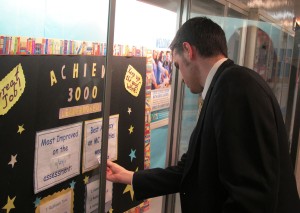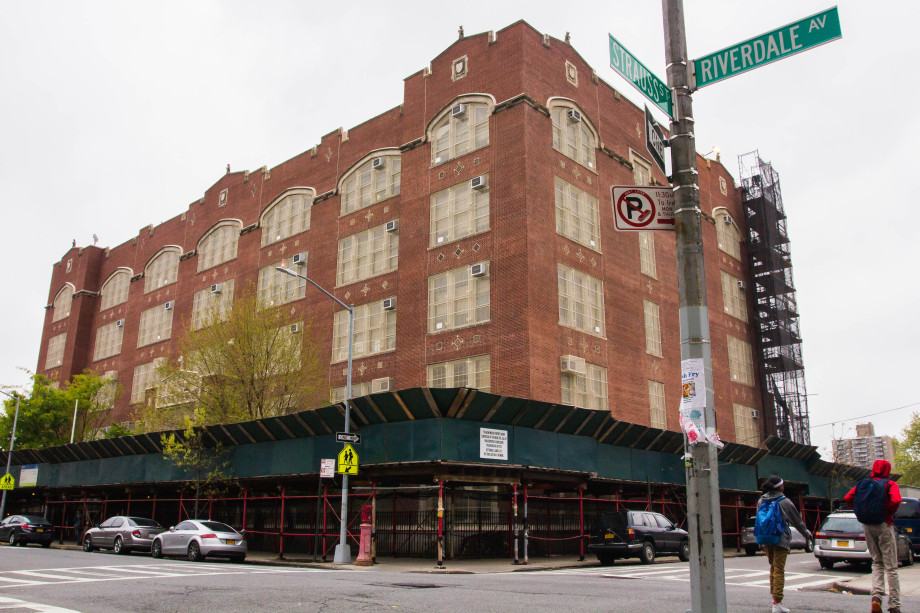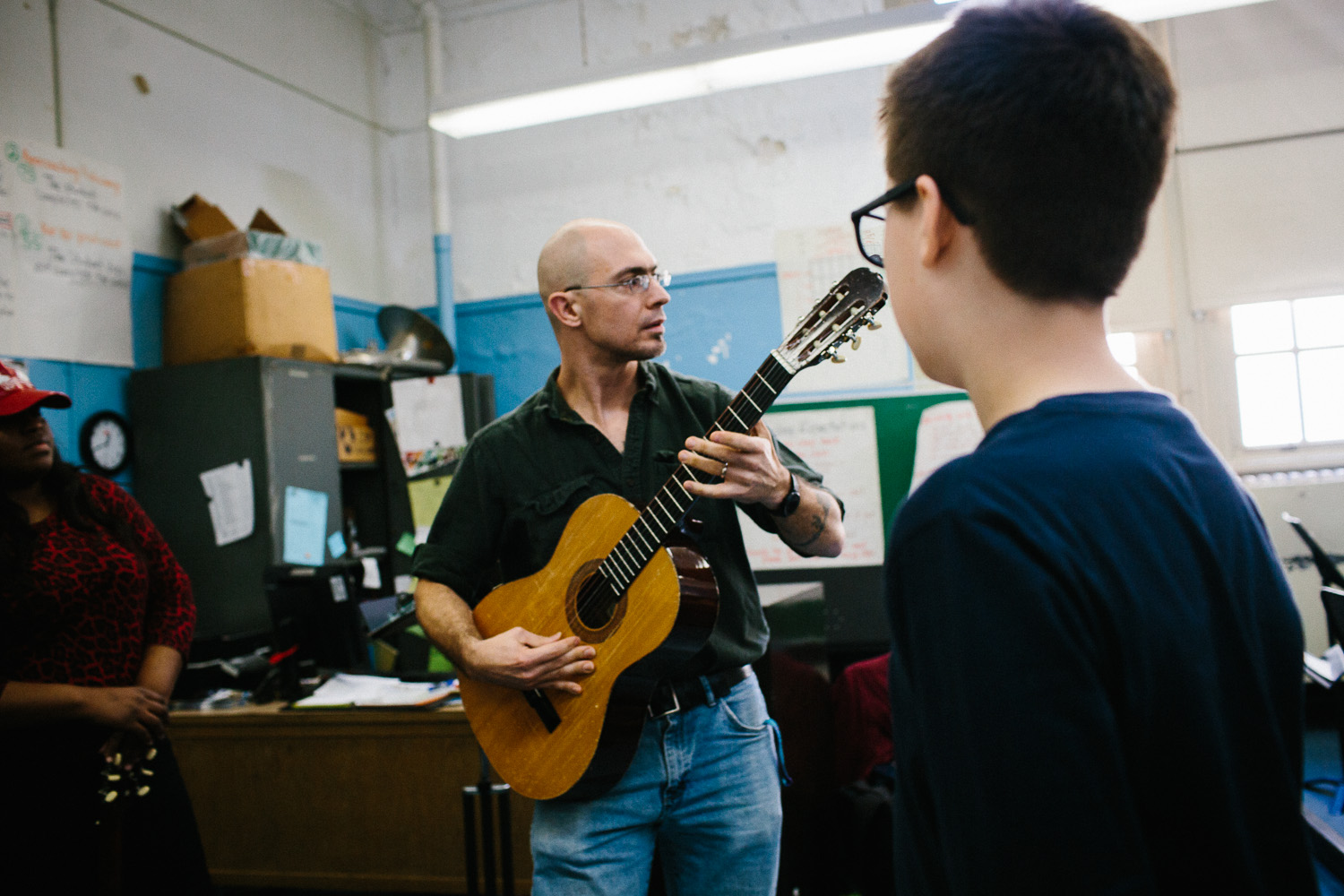In a brightly-tiled cafeteria in Crown Heights, Brooklyn one February morning, Will Ehrenfeld supervised students returning from winter break. One teen from the new, small high school for ninth through 14th graders approached him to shake hands. Another grumbled about the end of vacation. The 23-year-old all-purpose administrator responded with a smile, “I’m excited. I’m pumped.” And he meant it.

Ehrenfeld’s official title is community coordinator, an administrative catch-all position at Pathways in Technology Early College High School, one of the city’s small innovative start-up high schools, the first in the nation to offer an associate’s degree to high schoolers.
Ehrenfeld essentially plays the role of assistant principal by another name. Community coordinators have diverse roles in schools ranging from middle schools to technology high schools, but they essentially act as a liaison between the community, students and parents. Whatever his title, Ehrenfeld plays a vital role in a school’s everyday functioning. He acts as counselor, enrichment coordinator, parent liaison, outreach director, technology advisor, mentor, mediator, and all-purpose educator.
But Ehrenfeld not only assists in the school’s everyday functioning—he also helped plan the school. Pathways in Technology is a new school model under development, said Ehrenfeld. “To have such a big part in developing something that is already so significant is really rewarding for me,” he said. The former Tweed Hall consultant watched from the board room as the school progressed from an idea announced in 2010, to a real school that opened this September in Paul Robeson High School. Now he walks the halls lined with blue lockers, boards displaying student achievements, and classrooms where more than 100 students take classes as part school’s the first freshman class.
As an administrator, Ehrenfeld has continued to develop ways to engage students in their education. After students left for gym class, he wrote his to-do list on a notepad: recruit students to help with Saturday’s open house, pick up posters about their college ready students, coordinate permission slips for a screening of CNN’s “Black in America series” on Silicon Valley entrepreneurs, an event he initiated via Twitter.
“Will is like that roving linebacker, for when there is a breach in the line, he shows up there and fills the gap, and we stay solid and we hold the fort,” said English Language Arts teacher Duane Williamson.
“Whenever anyone needs help with anything, he’s there,” said Bryan Rosario, 15, who once lost his PlayStation Portable on a field trip to IBM headquarters, and Ehrenfeld somehow retrieved it.
But it’s “the little milestones,” Ehrenfeld said, that make it all worthwhile: like students learning to write their first code in technology class, or deciding to walk away from a fight. “It’s why we are all here,” he said.
One of his favorite endeavors is a “Real Talk, Real Men” club he runs with a colleague that provides a safe space for young teenaged boys to discuss the issues they face in and outside the school building with adults they trust. Meetings begin with songs, such as the Cure’s “Boys Don’t Cry,” or videos to help stimulate discussion. “We’re not trying to teach any one thing,” said Ehrenfeld, “but we’re trying to establish the trust that is necessary in order to make a really significant change down the road.”
Ehrenfeld connects with the young men, because he understands who they are. Ehrenfeld grew up in Vernon, CT, a suburban town outside of Hartford, with an older brother, Joshua, 25, and a younger sister, Jamie, 19. Both his parents, who worked in the foster care system, stressed the importance of education. His mother focused on child abuse issues, and his father concentrated on adolescents transitioning from the foster care system.

Ehrenfeld first became interested in pursuing education as a potential career while studying in Northern Ireland in 2008 as a Tufts University student. The political science and peace and justice studies major decided to go abroad, because he wanted to push himself to live in another place and learn more about the world. While in Ireland, he studied how history was taught in Protestant and Catholic secondary schools. The role schools could play in conflict and potential reconciliation fascinated him.
After graduating in the spring of 2010, Ehrenfeld landed a research position that led to a job as a consultant for the New York City school district in November in areas of career and technical education. During his first week on the job, he learned about a project for a new Career and Technical Education school. It would open in 2011 as Pathways in Technology, a school designed around technology engineering, robotics, and the idea that it would not end after the 12th grade, but rather two years later in community college with an associate’s degree.
Ehrenfeld had once designed a school as a final assignment in college. It was a school without walls, where students could call teachers by their first name, and where students could take any classes they wanted. Though he knew about school choice in places, such as New York City, the concept of designing a school seemed unreal to him.
Ehrenfeld had attended public schools that had existed for decades. Students were tracked into different levels beginning in fifth grade, a system which he said “reinforces privileges that already existed.” He noticed that almost a quarter of his freshman class dropped out by the time he graduated. Although Ehrenfeld took advanced courses, he didn’t feel as academically prepared for college as the students sitting in class next to him from other high schools.
That experience pushed him to advocate for the quality of education for students of different needs. The school he helped design in reality is much different. Structure, he realized as a mature adult, was important for students. Not having a clear path after college himself reinforced his belief in providing students with the structure to attain their goals.
Ehrenfeld recently helped develop the theme, “Rigor, Roadmaps, and Role Models,” a mission aligned with P-Tech, which offers students mentors and a clear path to gain a community college degree.
Today, Ehrenfeld said he may lean towards earning a teaching certificate, but he also considered working at an international non-profit and may eventually work in policy or academics. “I’m still struggling to committing to only one path,” he said.
Freshman Davion Hutchinson said Ehrenfeld is a great role model who breaks down situations so students can understand them. “He just knows what kids think,” said Hutchinson, 14. “He’s been in that place before.” He said Ehrenfeld helped him understand the importance of listening in class and then being able to relax after school. “He makes me feel more open-minded,” said Hutchinson, “like I can just be myself. I don’t have to act different.”
Co-Community Coordinators Dwayne Griffiths and Ehrenfeld recently created posters for an advisory session where students wrote how they would handle conflict. “He’s willing to ask questions and willing to learn more and more about his craft,” said Griffiths.
Ehrenfeld appreciates this moment in his life. “For me, it’s just as important of an opportunity from the learning perspective, as from the professional perspective,” he said.




Beautifully written. He is truly a blessing to “our” school
As a youth motivator, I have been asked to offer strategies aimed at toddlers so I’ll start with the common problems of how to keep track of a precious Teddy or Blankie and how to get babay off the bottle. The obvious answer is not to let it out of the crib or bed. You can accomplish this easily by making it seem like it’s your toddler’s idea.
Motivation is the energy you feel within to accomplish your goals. When you have planned to achieve something in life, it is the driving force that keeps you going towards it. It is therefore the basic emotions that keep you working towards you goals even when things do not look so good. In fact the presence of motivation factors is all the more important when you are going through a rough patch in your life.